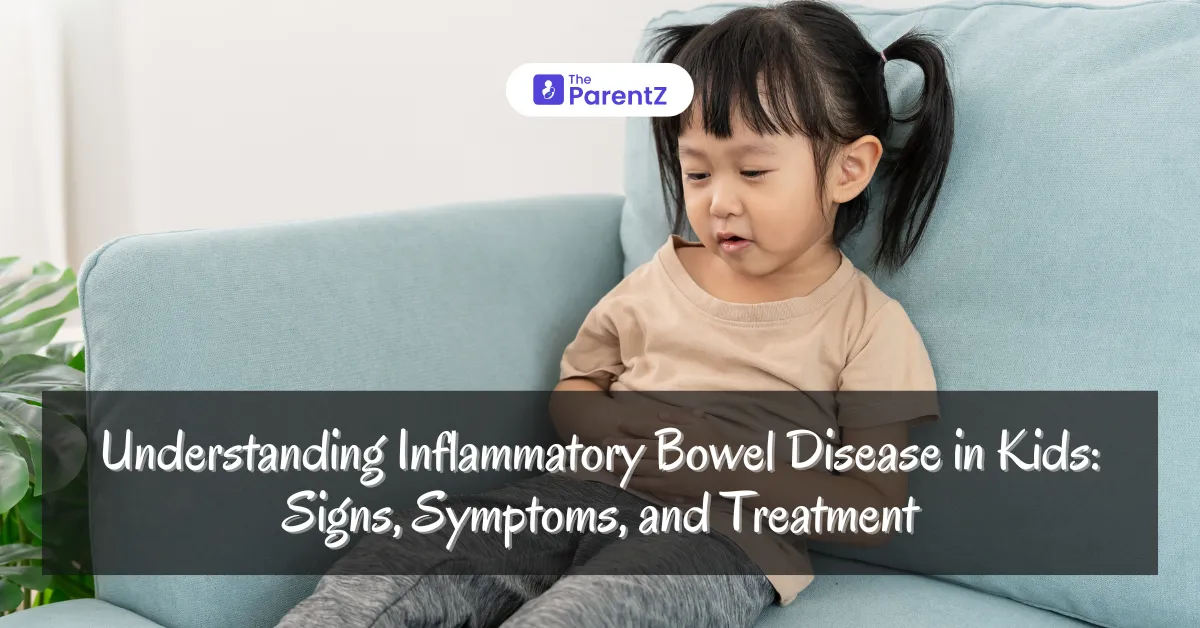Inflammatory Bowel Disease (IBD) is a chronic condition affecting the gastrointestinal (GI) tract, with two primary types—Crohn’s disease and Ulcerative Colitis. Though commonly diagnosed in adults, IBD can significantly impact children and adolescents, affecting their growth, nutrition, and quality of life. Early diagnosis and effective management are crucial in minimizing long-term complications.
What is Inflammatory Bowel Disease?
1. Crohn’s Disease
• Location: Can affect any part of the GI tract from mouth to anus, most commonly the ileum and colon.
• Pattern: Discontinuous “skip lesions” with inflammation penetrating multiple layers of the bowel wall.
2. Ulcerative Colitis
• Location: Affects only the colon and rectum.
• Pattern: Continuous inflammation, limited to the innermost lining of the bowel.
Signs and Symptoms
Common Symptoms of IBD in Children
1. Abdominal Pain and Cramps
• Persistent pain, often worsening after meals.
2. Chronic Diarrhea
• Watery or bloody diarrhea, sometimes with mucus.
3. Weight Loss and Poor Growth
• Failure to thrive, delayed puberty, and weight loss despite adequate calorie intake.
4. Fatigue and Anemia
• Persistent tiredness due to chronic inflammation or iron deficiency anemia.
5. Fever
• Low-grade fever indicating ongoing inflammation.
6. Rectal Bleeding
• Blood in stools, more common in ulcerative colitis.
7. Loss of Appetite and Nausea
• Aversion to eating due to pain or nausea.
Extraintestinal Symptoms
• Skin Rashes: Erythema nodosum, pyoderma gangrenosum.
• Joint Pain: Arthritis, often in large joints.
• Eye Inflammation: Uveitis, episcleritis.
Red Flags Warranting Immediate Attention
• Severe abdominal pain.
• High fever with no clear source of infection.
• Persistent vomiting.
• Significant weight loss.
Diagnosis
Early diagnosis is crucial for managing IBD effectively in children. The diagnostic process typically includes:
1. Medical History and Physical Examination
• Assessing growth patterns, family history of IBD, and symptom duration.
2. Laboratory Tests
• Blood Tests: To check for anemia, inflammation markers (C-reactive protein, ESR), and nutrient deficiencies.
• Stool Tests: To rule out infections and check for fecal calprotectin, indicating intestinal inflammation.
3. Imaging Studies
• Endoscopy and Colonoscopy: Visualize and biopsy affected areas.
• MRI or CT Enterography: Evaluate the extent of inflammation and complications like fistulas or abscesses.
4. Genetic Testing
• Occasionally used to identify genetic markers associated with IBD.
Treatment Options
Managing IBD in children involves a combination of medication, dietary changes, and sometimes surgery. The goal is to reduce inflammation, manage symptoms, and improve growth and development.
1. Medication
A. Anti-Inflammatory Drugs
• Aminosalicylates (5-ASA): Such as mesalamine, useful in mild to moderate cases, particularly ulcerative colitis.
B. Immunosuppressants
• Azathioprine, 6-Mercaptopurine (6-MP): Reduce immune system activity to prevent flare-ups.
• Methotrexate: Used when other medications are ineffective.
C. Biologics
• Anti-TNF Agents (e.g., Infliximab, Adalimumab): Target specific inflammation pathways, used in moderate to severe cases.
• Integrin Inhibitors (e.g., Vedolizumab): Block immune cells from entering the GI tract.
D. Corticosteroids
• Used short-term to control acute flare-ups. Long-term use is avoided due to side effects like growth suppression and bone thinning.
2. Nutritional Therapy
A. Exclusive Enteral Nutrition (EEN)
• Special formula diets for 6-8 weeks to induce remission, particularly effective in Crohn’s disease.
B. Supplemental Nutrition
• High-calorie, nutrient-rich supplements to address malnutrition and support growth.
C. Specific Carbohydrate Diet (SCD) or Low FODMAP Diet
• Tailored dietary plans to reduce symptoms and improve gut health.
3. Surgery
Indicated in cases where medical management fails or complications arise:
• For Crohn’s Disease: Resection of severely affected bowel segments.
• For Ulcerative Colitis: Colectomy with ileoanal anastomosis may be considered.
4. Psychosocial Support
Living with IBD can be challenging for children and their families. Counseling and support groups help in coping with the psychological impact of chronic illness.
5. Regular Monitoring
Frequent follow-ups are crucial to monitor growth, development, and treatment efficacy.
Living with IBD: Tips for Parents and Caregivers
• Educate Yourself and Your Child: Understand the condition, treatment options, and lifestyle adjustments.
• Keep a Symptom Diary: Track symptoms, dietary triggers, and medication side effects.
• Encourage Open Communication: Make your child comfortable discussing their symptoms and concerns.
• School Planning: Inform teachers and school nurses about your child’s condition for proper support.
• Promote a Balanced Lifestyle: Encourage a balanced diet, regular exercise, and adequate sleep.
Conclusion
Inflammatory Bowel Disease in children requires a comprehensive approach to manage symptoms, promote normal growth, and maintain a good quality of life. With early diagnosis, tailored treatment plans, and ongoing support, children with IBD can lead healthy and active lives.





Be the first one to comment on this story.